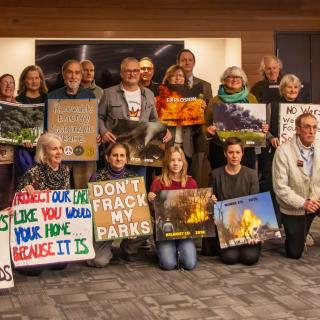As the primary election for Ohio governor draws near, voters want to know where candidates stand on issues that affect Ohioans the most. To get some answers, Yes We Can Columbus hosted a candidates’ forum on March 12 at Strongwater Food and Spirits.
Democratic and Green gubernatorial candidates answered questions that were crowdsourced from the audience — about economic segregation, affordable housing, funding public education, police brutality, abortion rights, and gun control. Candidates proposed various solutions to these issues, but they had no major disagreements about the causes and nature of the problems.
Candidates did disagree about the influence of moneyed interests in politics. Moderator Dr. Melissa Crum asked the candidates these questions: Will you pledge to refuse contributions from corporate PACs, from the fossil fuel industry, and from the National Rifle Association? And what will you do fight the influence of money in our politics at all levels of government?
Democrat Dennis Kucinich answered “yes” to all three pledges. “I’ve spent a lifetime fighting corporate interests,” he said. “I won’t take corporate money. I’m not their candidate. I will push for public financing of Ohio elections.”
Kucinich gestured toward the empty seat reserved for Democratic candidate Richard Cordray. “The fact that there is a candidate missing today who couldn’t answer ‘yes’ to maybe any of those questions is a serious problem,” he said. Cordray has an “A” rating from the NRA.
Democratic State Senator Joe Schiavoni pledged to refuse campaign dollars from the NRA. “I never have, and I never will,” he said. But Schiavoni admitted that as Senate Minority Leader, he accepted money from corporate PACs and the fossil fuel industry. “I was going up against 23 Republicans who had millions and millions of dollars,” he said. “I never did any favors or showed any favoritism to those PACs that were donating to my campaign. I promise you that it did not change the way I voted, or who I fought for at the Statehouse.”
“I will not accept any money from any corporation,” said Constance Gadell-Newton. “No corporate PACs, no fossil fuels, no money from the NRA. All of our funding comes from humans. We represent the people of Ohio. As a Green Party candidate, I’m someone who lives by my principles. We don’t just say, ‘Get corporate money out of politics.’ We’re living this in this campaign right now. Our campaign is powered by people power. We have the lowest cost per vote of any candidate.”
Democrat Bill O’Neill pledged to refuse donations from corporate PACs and the NRA, but not from the fossil fuel industry. “Fracking is a very dangerous process, but if properly regulated, it can protect the water,” he said. “There is a long history of reducing our use of coal by using natural gas that comes from fracking, and if properly done, it’s OK. As to the fuel industry, they’re going into alternatives right now. BP is investing in solar and wind in addition to their normal products.”
O’Neill continued his defense of fossil fuels into two follow-up questions from Dr. Crum: “Do you agree that we must transition Ohio to 100% renewable energy as quickly as possible? And beyond just keeping the Strickland renewable energy standards, how would you work to aggressively increase investment in renewable energy and away from fossil fuels across the state?”
“Yes, but we will never get there 100%,” O’Neill said. “If the state were to prioritize clean energy, we could make a big dent.” O’Neill’s only proposed solution was symbolic and weak: “Solar panels on top of every government building in Ohio!”
Kucinich proposed “investment of state dollars in renewables and making it a part of economic development. People in southeastern Ohio are being exploited by the fracking industry,” he said. “Their land is being ruined. Their children are having adverse health effects. It’s a sacrifice zone. It’s immoral. As governor, I intend to put an end to fracking and deep injection wells.”
Schiavoni agreed that Ohio must “move toward” renewable energy by reversing the freeze on Ohio’s clean energy standards and incentivizing wind and solar energy. He proposed “cleaning up industrial brownfields across the state and retraining our workforce to work in this industry.”
“Addressing climate change has to be a top priority in Ohio,” said Green candidate Gadell-Newton. “All too often, when you hear politicians talk about green energy and environment, they’re pitting the environment against workers and the economy. This is a false narrative. I believe that in Ohio we can have a strong economy and a green, sustainable environment. We need to transition very quickly away from fossil fuels, and ban fracking and injection wells. My plan is to promote the creation of green energy co-ops that are worker-owned and consumer-owned. We have a steel industry in Ohio that can be used to build solar and windmills. We can create a green energy industry in Ohio, built by Ohioans, for Ohioans!”



